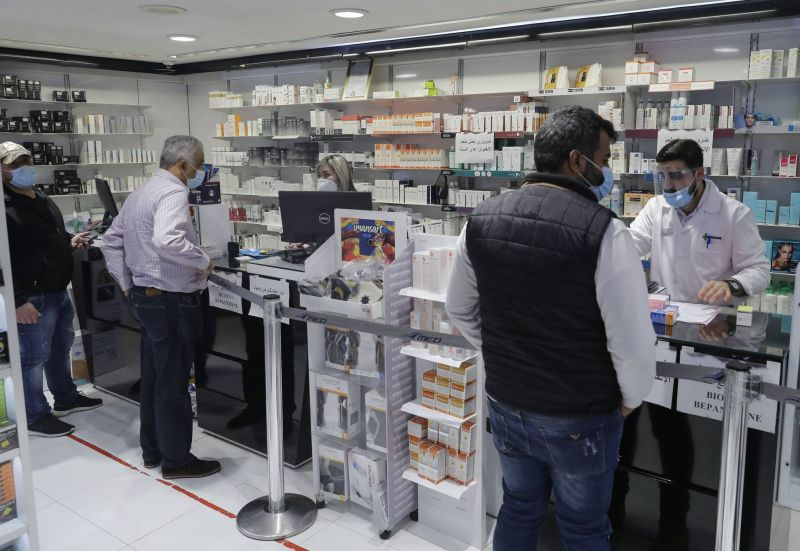
Medicine shortages persist, even though importers say they have begun distributing stocks from their warehouses. (Credit: Joseph Eid/AFP)
BEIRUT — Pharmaceutical importers are distributing subsidized medicines to the market on a reported promise from the central bank that it will pay $180 million in outstanding invoices for the products, Karim Gebara, the head of the Lebanese Pharmaceuticals Importers and Wholesalers Association, told L’Orient Today.
However, both Gebara and a Health Ministry spokesperson affirmed that Banque du Liban had yet to make the $180 million payment — a fraction of the total amount owed to importers of medical supplies — that the ministry on Thursday said the bank promised in order to stave off debilitating drug shortages at hospitals across the country.
Asked about the $180 million on Tuesday, a Health Ministry spokesperson said that BDL was supposed to “open lines of credit for the imported medicines to enable their distribution to the market, which has not yet been done.”
Earlier Tuesday, caretaker Health Minister Hamad Hassan had visited outgoing Prime Minister Hassan Diab to inform him “of the truth of the central bank governor’s numbers” pertaining to medical imports, claiming that not only had BDL failed to fulfill its promise to pay out $180 million on Friday to cover invoices, its assertions on the total amount of invoices submitted by medical goods importers in 2021 as well as the amount it has thus far paid out relating to those invoices are questionable.
The minister contended that most of the $485 million BDL says it has paid up this year relates to invoices from July to December 2020, and that the $1.3 billion in invoices BDL claims to have received, which exceeds last year’s total requests for imports, is in fact inflated.
Gebara, meanwhile, said, “Importers are currently distributing [subsidized] products or medications … even though the payments have not been made.”
He added that “$180 million is the value of medications imported to Lebanon and stored in its warehouses. BDL and the Health Ministry promised to subsidize these pharmaceutical imports.”
Last week, caretaker Health Minister Hamad Hassan had told VDL radio (100.5) that holdups in foreign currency payments to importers were resulting in medical goods being stuck in warehouses until outstanding invoices were met.
When contacted by L’Orient Today on Tuesday, a BDL spokesperson indicated they had no comment to make on the payment.
Meanwhile, Sleiman Haroun, the head of the private hospitals’ syndicate, who last week sounded the alarm that available quantities of anesthetics and other medications were running dangerously low, told L’Orient Today that shortages persist.
Acknowledging BDL’s stalled payments as the crux of delays, Haroun criticized importers for their unwillingness “to sell health products at a rate other than the market’s or reporting to be out of stock.”
“Hospitals are demanding open visits to importers’ warehouses,” he added, explaining that they want to check whether the stocks are available or not.
BDL has maintained subsidies on essential imports including medicines, wheat and fuel, since shortly after Lebanon’s national currency began to deviate from its official peg — LL1,507.5 — to the dollar in mid-2019. The lira is presently trading just shy of LL13,000 on the parallel market. Unsubsidized, these necessary imports would become almost nine times more expensive overnight.
However, importers of subsidized goods have increasingly reported payment delays from the central bank, with many having to resort to parallel market dollar purchases to fund imports upfront as they await reimbursement. Most recently, long lines have formed at gas stations across the country as tankers await payment before unloading their cargo.
BDL last week admitted in a statement that it would be unable to meet all subsidized medical sector imports without dipping into its mandatory reserves — something its chief Riad Salameh has repeatedly said he will not do. With more than $600 million in outstanding invoices for essential medical supplies, not counting the $180 million that the Health Ministry said the bank has promised to pay, it remains unclear how BDL will reimburse the importers, who are presently either in debt or out of pocket for these products.
“Lebanon is ruining its reputation with pharmaceutical companies by delaying payday and not paying at all,” Gebara said, warning, “This could lead to the destruction of the health sector in the country.”